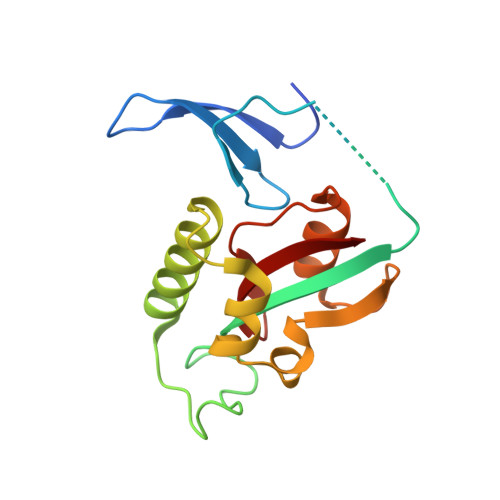Re-Evaluating PIN1 as a Therapeutic Target in Oncology Using Neutral Inhibitors and PROTACs.
Liu, C., Chen, Z., Chen, T., Song, H., Shen, J., Yuan, X., Xia, S., Liu, Q., Chen, Q., Tian, Q., Meng, X., Han, Z., Dong, X., Yang, Y., Cai, L., Cheng, X., Jia, Y., Liu, G., Li, J., Ge, J., Dou, D.(2024) J Med Chem 67: 15780-15795
- PubMed: 39229909
- DOI: https://doi.org/10.1021/acs.jmedchem.4c01412
- Primary Citation of Related Structures:
9INR - PubMed Abstract:
Peptidyl-prolyl cis-trans isomerase NIMA-interacting 1 (PIN1) has emerged as a promising therapeutic target for cancer treatment. However, the current PIN1 inhibitors have shown limited efficacy in animal models, leaving the question of whether PIN1 is a proper oncologic target still unanswered. By screening a 1 trillion DNA-encoded library (DEL), we identified novel nonacidic compounds. Among resynthesized DEL compounds, DEL1067 - 56 - 469 ( A0 ) is the most potent one (KD = 430 nM, IC 50 = 420 nM). Further optimization of A0 resulted in compound C10 with much improved potency (KD = 25 nM, IC 50 = 150 nM). As an alternative approach, C10 was then converted into proteolysis targeting chimeras (PROTACs) in order to achieve deeper downregulation of the PIN1 protein in cancer cell lines. Unfortunately, neither PIN1 inhibitors nor PIN1 PROTACs demonstrated meaningful antiproliferation activity. In addition, siRNA knock-down experiments provided unfavorable evidence of PIN1 as an oncologic target. Our findings highlight the complexity of targeting PIN1 for cancer therapy.
- HitGen Inc., Shuangliu District, Chengdu, Sichuan 610200, P. R. China.
Organizational Affiliation:



















